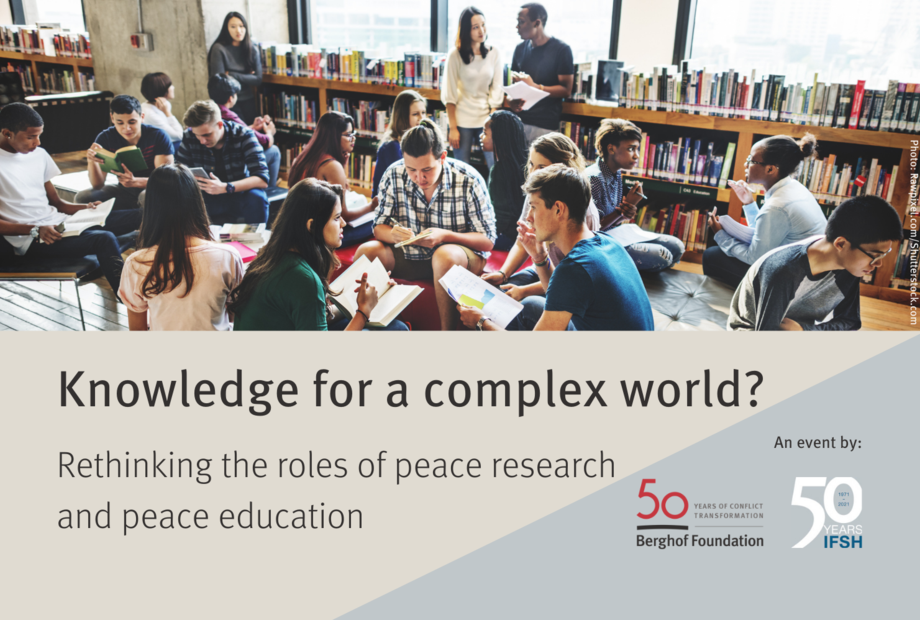The IFSH and the Berghof Foundation: Both institutes marked their 50th anniversaries in 2021, and both spread knowledge and ideas for a more peaceful and secure world.
As part of their anniversary celebrations, the IFSH and the Berghof Foundation hosted an online panel discussion on 25 November. The event, Knowledge for a Complex World: Rethinking the roles of peace research and peace education, focussed on the question of how the fields of peace research and peace education can pool their skills and expertise in order to jointly produce and disseminate knowledge for an increasingly complex world.
Common themes, similar mission
As current threats such as the Coronavirus pandemic, climate change, and additional security risks arising from emerging technologies show, the threats to global security are becoming ever more complex. While this presents politicians with new challenges, it is also important to critically evaluate how concrete knowledge about interrelated security policy issues is produced and disseminated. Bridging the gap between peace research and peace education would seem a natural way to address this. Despite their shared origins, the two fields have increasingly drifted apart. In light of the current challenges, however, closer collaboration appears imperative.
Both disciplines are now faced with the current political challenges. And while peace research in the past has mostly focussed on armed conflict, the field must now broaden its horizons, said Professor Dr Ursula Schröder, director of the IFSH. It is a question of creating lasting peace, Professor Schröder said, and of responding to global challenges. Knowledge about peace must therefore be pooled, shared and spread.
An international panel
The roughly hour-long discussion that followed featured the following participants: Berit Bliesemann de Guevara, professor of international politics at Aberystwyth University; Elvira Rosert, junior professor at the IFSH and the University of Hamburg; Norbert Friters-Reemann, professor of educational sciences at the Catholic University of Applied Sciences of North Rhine-Westphalia in Aachen; and Tony Jenkins, managing director of the International Institute on Peace Education at Georgetown University in Washington, D.C. The peace researchers and educators exchanged ideas on how peace education can take up and spread insights gleaned from peace research.
Scholarly analytical skills constitute an important component of this, and one that is needed in order to address complex problems such as climate change, the panel said. In the first place, scholarship can point out the decisive factors that have led to a given problem. Knowing these and understanding the various interests of all parties involved are essential prerequisites for being able to develop solutions.
Theory as both strength and weakness
Empirical knowledge and the ability to analyse are the strengths of scholarship, but one of the things that is lacking is an aptitude for transforming scholarship’s insights and wealth of experience into something easily accessible. This is where peace education comes into play. However, the field must not become overloaded with expectations, several panellists warned. Both the challenges and the opportunities lie in a broader approach to peace education, one which would have to go beyond scholastic peace education. What is needed is not more lesson plan topics, but rather the promotion of competencies like empathy and the ability to listen and reflect.
In order to reach the target audience, however, it is also important to package and present knowledge from peace research in a way that is appropriate for school students and audiences outside academia. And it is not only important to gather knowledge, but to bring together those who produce it as well.
Bring together both knowledge and knowledge producers
What needs to happen in order to bring peace research and peace education closer together? Interdisciplinary approaches and thinking outside the box are important elements in becoming more productive, the panellists explained. In addition, the work should become more problem-orientated.
You can find a recording of the 25 November 2021 event Knowledge for a Complex World here.
Please find more information on our event webpage





